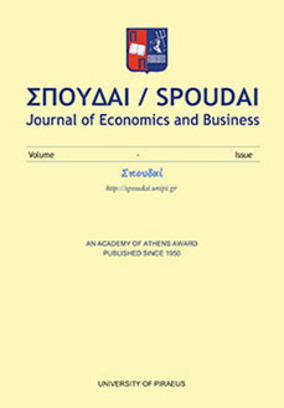Similarities and differences between households’ and SME’s financial knowledge and behaviour : a Greek survey
Part of : Σπουδαί : journal of economics and business ; Vol.63, No.1-2, 2013, pages 7-30
Issue:
Pages:
7-30
Abstract:
In this paper, we examine the financial literacy, thus the financial behaviour of 352 Greek households. In turn, we compare our findings with results from a similar survey we conducted on an equivalent sample of small and medium-sized enterprises (SMEs). Our aim was to realise if there is any link between financial knowledge and behaviour in each surveyed micro-system and, further, indicate similarities and differences between them. Ιt is argued that the sample of households make better use of financial knowledge than the surveyed SMEs. Further, even in cases where financial knowledge was of high performance, both groups did not perform accordingly in terms of their financial behaviour. Such results indicate the complexity of the relationship between know- ledge and behaviour.
Subject:
Subject (LC):
Keywords:
households, small and medium-sized enterprises, financial knowledge, financial behaviour, Greece
Notes:
Περιέχει πίνακες και βιβλιογραφία
References (1):
- Atkinson, A., McKay, S., Collard, S., Kempson, E., 2007. Levels of Financial Capability in the UK.Public Money and Management, Volume 27, Issue 1, pp. 29-36.Basly, S., 2007. The internationalization of family SME: An organizational learning and knowledgedevelopment perspective. Baltic Journal of Management, Volume 2, Issue 2, pp. 154-180.Bernheim, D., Garrett, D. M., 2001. The effects of financial education in the workplace: evidencefrom a survey of households. Journal of Public Economics, Volume 87, Issues 7-8, August2003, pp. 1487-1519.Beverly, S. G., Sherraden, M., 2000. Institutional determinants of saving: implications for low-incomehouseholds and public policy. Journal of Socio-Economics, Volume 28, Issue 4, pp. 457-473.Bucher-Koenen, T., 2009. Financial Literacy and Private Old-Age Provision in Germany – Evidencefrom SAVE 2008. MEA Discussion Paper 192-09.Campbell, Y. J., 2006. Household Finance. The Journal of Finance, Volume 61, Issue 4, pp. 1553-1604.Chen, H., Volpe, P. R., 1998. An Analysis of Personal Financial Literacy Among College Students.Financial Services Review, Volume 7, Issue 2, pp. 107-128.Cohen, S., Kaimenakis, N., 2007. Intellectual capital and corporate performance in knowledgeintensiveSMEs. The Learning Organization, Volume 14, Issue 3, pp. 241-262.Field, A. P., 2005. Discovering statistics using SPSS (2nd edition). London, Sage, (http://www.statisticshell.com/docs/reliability.pdf). (26.12.2012).Field, E., Jayachandran, S., Pande, R., 2010. Do Traditional Institutions Constrain Female Entrepreneurship?A Field Experiment on Business Training in India. American Economic Review(Papers and Proceedings), Volume 100, No. 2, pp. 125-129.Gracia, L. J., Andu΄jar, S. S., 2007. Financial Structure of the Family Business: Evidence From aGroup of Small Spanish Firms. Family Business Review, Volume 20, Issue 4, pp. 269-287.Greek Small Business Institute, 2008. An Exploration of Needs of Small Greek Firms throughLife-long Educational Programmes, (http://www.imegsevee.gr/attachments/article/108/anagkwn_mikrwn_epixeirisewn.pdf) [In Greek]. (26.12.2012).Gunnarsson, J., Wahlund, R., 1997. Household financial strategies in Sweden: An exploratorystudy. Journal of Economic Psychology, Volume 18, Issues 2-3, pp. 201-233.Hilgert, M. A., Hogarth, J. M., Beverly, S. G., 2003. Household financial management: the connectionbetween knowledge and behaviour. Federal Reserve Bulletin, (July), pp. 309-322.Hobson, K., 2003. Thinking Habits into Action: The role of knowledge and process in questioninghousehold consumption practices. Local Environment: The International Journal of Justiceand Sustainability, Volume 8, Issue 1, pp. 95-112.Karlan, D. S., Valdivia, M., 2010. Teaching Entrepreneurship: Impact of Business Training on MicrofinanceClients and Institutions. Review of Economics and Statistics (forthcoming).Katz, J., Cabezuelo, A., 2004. Measure of Financial Sophistication. In: Handbook of entrepreneurialdynamics, Chapter 32, pp. 372-383.Kline, P., 1999. The handbook of psychological testing (2nd ed). London: Routledge.Kuzina, E. O., 2005. Puzzles of saving behaviour of Russian Households, (http://new.hse.ru/sites/infospace/podrazd/uvp/id/preprints/DocLib/OK_savings.pdf). (26.12.2012)Levy, M., Loebbecke, C., Powell P., 2001. SMEs, co-opetition and knowledge sharing: the is role.Global Co-Operation in the New Millennium, The 9th European Conference on InformationSystems, Bled, Slovenia.Lindamood, S., Hanna, S. D., 2006. The More Financially Knowledgeable Person in Older CoupleHouseholds. Consumer Interests Annual, Volume 52, pp. 327-342. Lusardi, A., Mitchell, O. S., 2005. Financial Literacy and Planning: Implications for RetirementWellbeing. Working Paper No. WP 2005-108, University of Michigan Retirement ResearchCenter. (http://www.mrrc.isr. umich.edu/publications/papers/pdf/wp108.pdf). (26.12.2012).Lusardi, A., Mitchell, O. S., 2007. Financial Literacy and Retirement Preparedness: Evidence andImplications for Financial Education, Business Economics, Volume 42, Number 1, pp. 35-44.Marvel, M., 2001. Improving performance in small and medium-sized hotels: the Swiss experience.Travel & Tourism Analyst, No. 5, pp. 43-60.O’Neill, B., 2002. Twelve key components of financial wellness. Journal of Family & Consumer Sciences,Volume 94(4), pp. 53-58.Pillania, R. K., 2006. Leveraging knowledge for sustainable competitiveness in SMEs, International.Journal of Globalisation and Small Business, Volume 1, Number 4, pp. 393-406.Pruzan, P., 2001. The question of organizational consciousness: can organizations have values,virtues and visions?, Journal of Business Ethics, Volume 29, No. 3, pp. 271-84.Robb, C. A., 2011. Financial Knowledge and Credit Card Behavior of College Students. Journalof Family and Economic Issues, Volume 32, Issue 4, pp. 690-698.Rooij, V. M., Lusardi, A., Alessie, R., 2007. Financial literacy and stock market participation.Michigan Retirement Research Center. (http://www.pensionreforms.com/Preview.aspx?462).(26.12.2012)Schagen, S., Lines, A., 1996. Financial literacy in adult life: a report to the Natwest Group CharitableTrust. Slough, Berkshire: National Foundation for Educational Research.Stefanitsis, M., Fafaliou, I., Hassid, J., 2013. Does financial Knowledge in Small & Medium-SizedEnterprises matter? An empirical survey for Greece. International Journal of Economics andBusiness Research, 2013 Volume 5, No. 1, pp. 96-113.Vitt, L. A., Anderson, C., Kent, J., Lyter, D., Siegenthaler, J., Ward, J., 2000. Personal Financeand the Rush to Competence: Financial Literacy Education in the U.S. Institute for Socio-FinancialStudies, FunnieMae Foundation.Vos, J. P., Keizer, J. A., Halman, J. I. M., 1998. Diagnosing Constraints in Knowledge of SMEs.Technological Forecasting and Social Change, Volume 58, Issue 3, pp. 227-239.




